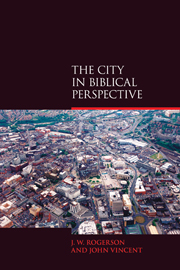Book contents
- Frontmatter
- Contents
- Preface
- Part 1 The city in the Old Testament
- Introduction
- Chapter 1 The Israelite City: History and Archaeology
- Chapter 2 The Israelite City: Biblical Perspectives
- Chapter 3 Making Connections
- Bibliography
- Part 2 The City in the New Testament
- Epilogue
- Bibliography
- Index of Biblical References
- Author Index
- Subject Index
Introduction
from Part 1 - The city in the Old Testament
- Frontmatter
- Contents
- Preface
- Part 1 The city in the Old Testament
- Introduction
- Chapter 1 The Israelite City: History and Archaeology
- Chapter 2 The Israelite City: Biblical Perspectives
- Chapter 3 Making Connections
- Bibliography
- Part 2 The City in the New Testament
- Epilogue
- Bibliography
- Index of Biblical References
- Author Index
- Subject Index
Summary
The word “city” is not easy to define. There is no equivalent in French or German, where the words “ville” or “Stadt” can be translated as either city or town. A popular misconception in Britain is that a city is a place with a cathedral. This is disproved by the fact that Southwell and Southwark have cathedrals but are not cities, and that Cambridge and Cardiff are cities but do not have cathedrals. These examples could be multiplied. Strictly speaking, a city in Britain is a settlement that has been given a charter entitling it to call itself a city. This often has its roots in past history so that some cities are comparatively small and unimportant politically or economically (such as Durham), while others are the opposite (such as Birmingham, Manchester and Liverpool).
The same problem of definition is to be found in the Old Testament. Students who are beginning Hebrew are usually taught that ‘îr means city, ignoring the fact that “city” in English is difficult to define! In fact, the Hebrew word ‘îr can be used in many different ways. It can be used without qualification, for example, of Jericho in Joshua 6:3, where English translations render the word as “city”. It can also be used, with an appropriate adjective, to describe unwalled villages, as in Deuteronomy 3:4 or fortified cities, as in 2 Kings 17:9.
- Type
- Chapter
- Information
- The City in Biblical Perspective , pp. 3 - 4Publisher: Acumen PublishingPrint publication year: 2009



